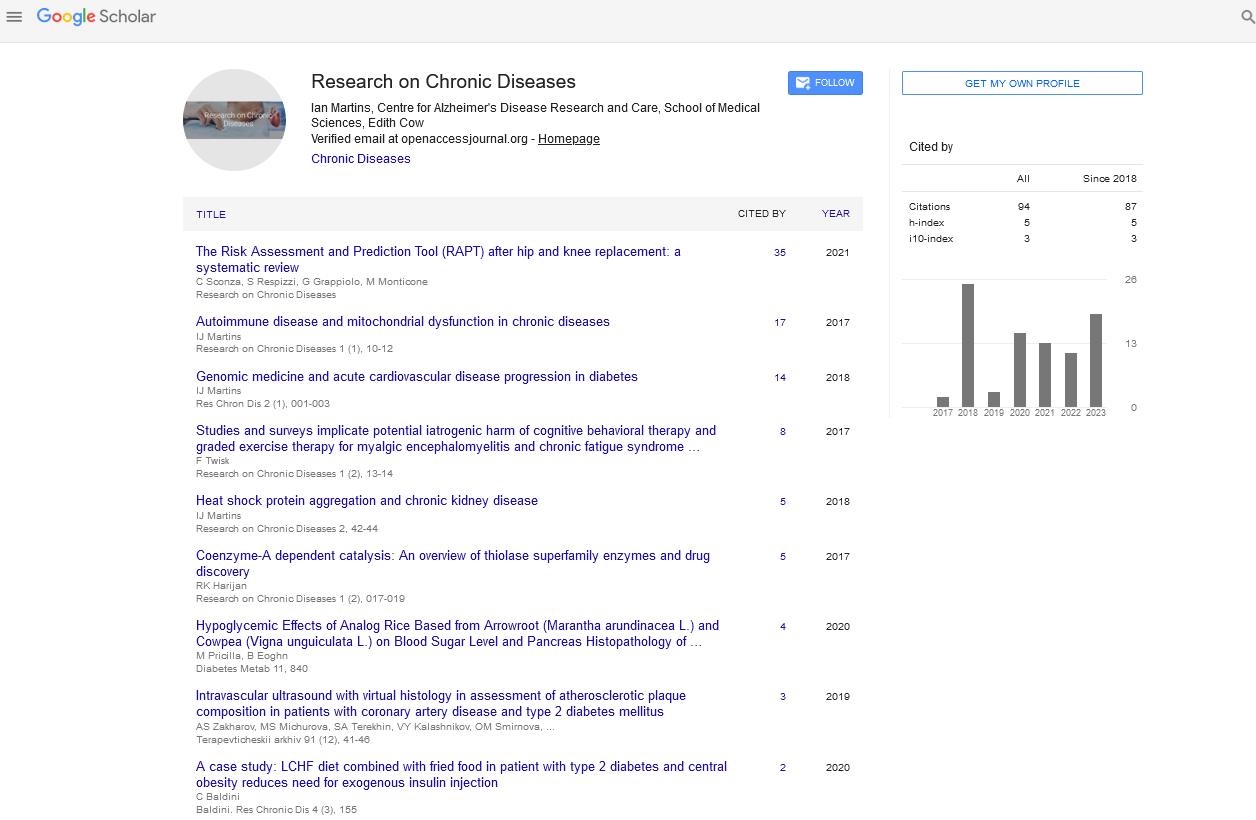Perspective - Research on Chronic Diseases (2024) Volume 8, Issue 2
Unraveling the Enigma of Myalgic Encephalomyelitis: Understanding the Complexities of a Chronic Illness
- Corresponding Author:
- Qi Ying Lean
Department of Pathophysiology,
University of Katara,
Kuching,
Malaysia
E-mail: leanqi@ying.com
Received: 06-Mar-2024, Manuscript No. oarcd-24-129026; Editor assigned: 11-Mar-2024, PreQC No. oarcd-24-129026 (PQ); Reviewed: 25-Mar-2024, QC No. oarcd-24-129026; Revised: 10-Apr-2024, Manuscript No. oarcd-24-129026 (R); Published: 17-Apr-2024, DOI: 10.37532/OARCD.2024.8(2).178-179
Introduction
Myalgic Encephalomyelitis (ME), also known as Chronic Fatigue Syndrome (CFS), is a debilitating and often misunderstood condition that affects millions of people worldwide. Despite its prevalence, ME remains a complex and enigmatic illness, characterized by profound fatigue, cognitive impairment and a myriad of other symptoms that significantly impact daily functioning and quality of life. In this article, we embark on a journey to unravel the mysteries of ME, exploring its etiology, manifestations and the challenges and triumphs of living with this chronic illness.
Description
Understanding myalgic encephalomyelitis
Myalgic Encephalomyelitis is a complex and multi-systemic disorder characterized by a range of debilitating symptoms, including severe fatigue, post-exertional malaise, cognitive dysfunction and autonomic dysfunction. While the exact cause of ME remains unknown, researchers have proposed various hypotheses, including viral infections, immune dysfunction and abnormalities in the central nervous system.
One of the hallmarks of ME is post-exertional malaise, a phenomenon in which physical or cognitive exertion can exacerbate symptoms and lead to a worsening of the condition. This often leads to a cycle of boom-and-bust, where individuals may experience periods of relative improvement followed by severe relapses, further complicating management and treatment.
Manifestations and impact
The symptoms of ME extend far beyond mere fatigue, encompassing a wide range of physical, cognitive and emotional manifestations. Individuals with ME may experience muscle pain, joint pain, headaches, sleep disturbances, gastrointestinal problems, and sensitivity to light, sound and other stimuli. Cognitive dysfunction, often referred to as “brain fog,” can impair memory, concentration and information processing, making it difficult to perform even simple tasks.
The impact of ME on daily life can be profound, affecting virtually every aspect of functioning, from work and education to relationships and social activities. Many individuals with ME are unable to work or attend school due to the severity of their symptoms, leading to financial strain, social isolation and feelings of frustration and hopelessness.
Diagnosis and management
Diagnosing ME can be challenging due to the lack of specific biomarkers and the overlap of symptoms with other conditions. A thorough medical history, physical examination and laboratory tests are often necessary to rule out other potential causes of symptoms and arrive at a diagnosis of exclusion.
Management of ME focuses on symptom relief, improving quality of life and minimizing exacerbations. This may involve a combination of pharmacological interventions, such as pain medications, sleep aids and antidepressants, as well as non-pharmacological approaches, including pacing, graded exercise therapy, cognitivebehavioral therapy, and dietary modifications.
Supportive therapies, such as physical therapy, occupational therapy and counseling, can also play a crucial role in helping individuals cope with the physical, emotional and social challenges of living with ME. Peer support groups and online communities provide valuable opportunities for individuals with ME to connect with others, share experiences and access information and resources.
Challenges and advocacy
Living with ME presents a myriad of challenges, from navigating the healthcare system and accessing appropriate care to managing symptoms and advocating for understanding and support from family, friends and society at large. Many individuals with ME face skepticism, disbelief and stigma from healthcare providers, employers and even loved ones, further compounding the burden of illness.
Advocacy efforts play a crucial role in raising awareness about ME, advocating for research funding and promoting policies and practices that support the needs of individuals with this chronic illness. Organizations and advocacy groups work tirelessly to educate the public, healthcare professionals and policymakers about the realities of living with ME and the urgent need for improved recognition, diagnosis and treatment.
Hope and resilience
Despite the challenges of living with ME, many individuals find strength, resilience and hope in the face of adversity. Through creativity, adaptability and mutual support, they carve out meaningful lives and make valuable contributions to their communities and the world. While there is still much to learn about ME, advances in research, advocacy and clinical care offer promise for a brighter future for those affected by this complex and often misunderstood illness.
Conclusion
Myalgic Encephalomyelitis is a complex and debilitating condition that affects millions of people worldwide. Despite its challenges, individuals with ME demonstrate remarkable resilience, courage and determination in the face of adversity. By raising awareness, advocating for research and support and fostering a culture of empathy and understanding, we can work together to improve the lives of those living with ME and pave the way for a future where all individuals with chronic illnesses are valued, supported and empowered to live their best lives.
